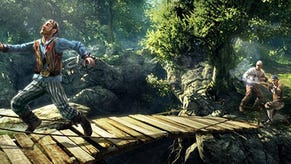Why Gothic Is More Believable Than Modern RPGs
Lessons in world design from 2001
One of the many nebulous concepts that spring up when writing about games is "a sense of place". We talk about worlds and locations and settings, but often these boil down to unusual geography or art direction – surface details and imagery rather than a real identity.
Gothic, by contrast, wasn't particularly pretty. Its setting wasn't the singular underground world of Arx Fatalis, nor the varied alien landscape of Morrowind. Instead, Piranha Bytes recognised back in 2001 that a place is a place not because of its landscape or biome or buildings, but because the people there make it one.
Most RPGs have NPC traffic. Gothic had a society.
The game itself is set within a microsociety built entirely on the situation its inhabitants find themselves in. A succinct introduction describes a war between humans and orcs, because of course it does. But instead of the war itself, Gothic is about some of its consequences. The humans need weapons, so seal off a prison mine behind a one-way magical barrier, and begin shoving convicts in. The idiot mages get their sums wrong and trap themselves too, and more poetically, the prisoners revolt and take over, and rationally extract demands from the King in return for his precious ore. The result is a sensible arrangement in which the prisoners continue to mine and export in exchange for their choice of goods from the outside world.
Even mentioning that here's where the player comes in feels like an afterthought. You're a convict booted across the barrier who happens to become relevant by chance. You're no Chosen One, merely The One Who Happened To Be Standing There.
All this setup demonstrates an ongoing thoughtfulness that's key to Gothic's appeal. After the revolt, the prisoners split into three camps - one honouring the agreement with the King, the others working on separate escape plans. It'd be easy to set these camps up as novelty playgrounds, extreme poles of Good, Bad, and Stupid Wizard Hat, but Piranha Bytes were smarter. The Old Camp devotes everything to maintaining ore exports, and protecting the resulting imports from the rebellious New Camp, whose theft and raids supplement their rice crops. Meanwhile, the third Sect camp pray to a dormant god in hope of liberation, and trade off the excess of their holy drug, along with plants and tinctures.
The camps feel not like interchangeable markers to swap loot for new tasks, but like societies. Each has a reason to exist, a means of providing for itself, a social order, and a long term goal. They're visually and culturally distinct despite the limitations of geography, but the distinctions aren't exaggerated. The New Camp are the nasty faction on paper, but in practice just want independence from the King and his toadies, and only cause as much trouble as is needed to keep their escape plan in motion. Given the opportunity, they wouldn't wipe out or even wage war on the others because, well, needlessly murdering dozens of people crosses a lot of lines, y'know? Rivalry doesn't have to mean total destruction. Besides, the other camps provide useful goods.
The Old Camp has no need for farms, but depends on safety and order, so keeps miners in line with a protection racket and rationed imports. But it's not the oppressive hole it could be. It's home to some of the nicest characters in the colony: a secure place where people look out for each other.
Finally, the Sect camp makes a swamp occupied by a cult feel like a nice place to live. People hang out and smoke and eat, they listen to sermons, they mash up plants for the alchemist, they train with swords. Higher-ups ask that members believe in the Seeker, but turn a blind eye to fakers if they pull their weight and keep up appearances.
It'd be easy to depict an overthrown penal colony as a hellhole full of bloodthirsty maniacs, but the prevailing attitude is that everyone's stuck there together. The communities and their inhabitants, both en masse and individually, act in ways that make sense given their circumstances.
In a word, Gothic is sensible.
There are few saints or pointlessly evil monsters. More common is pragmatic robbery or limited kindness - more people will help you out a little and few will screw you over for the hell of it. Think about it: if you were trapped in a village and went round stabbing people for larks, how long would the rest of your peers put up with you? Fights with humans are seldom unprompted, and even less commonly lethal - losing leaves you prone while the winner rifles through your pockets, or you theirs. Most NPCs won't hold a grudge afterwards, and accept loss with admirable grace. You're free to do likewise, although I can never resist the temptation to bully and rob a particular pair of miners every time I pass by. Some have friends who'll enact swift reprisals, but there are many opportunities to brawl, and some situations require a beating to get your point across. I lost my patience with one self-important cultist who tried to foist an odd job onto me before handing over something I wanted, so gave him a solid whack with a hammer and took it instead.
It's an interesting contrast to most games, where casual murder is the norm, and even those with a "pacifist run" tend to hand wring or fall over themselves admiring us for the enormously noble act of not massacring people. In Gothic, fights are fights, not murder-offs, and once someone's beaten, the matter is considered settled. It takes a deliberate, conscious decision to kill, and doing so triggers an unequivocal animation where you carefully crouch astride a helpless person and slay them. Even then, you're not irrevocably changed from NOT_MURDERER to MURDERER status, and not everyone will care, but it's remarkable how your perceptions and behaviour change when killing a nameless mook has social consequences. Even the hateful Rice Lord left a perennial stain on my conscience when I snuck past his goons and mercilessly skewered him in his sleep. Seeing peasants change from cheering on your fight to backing off in horror isn't the power trip it might sound like.
All this is introduced with the opening chapter, wherein you're a largely helpless newcomer earning his way into your choice of camps. Here you see the social and power structures, and while there are tiered ranks (which function as minor sub-factions), these are a formality, as the three interdependent camps operate on a vaguely socialised favour economy. Your reputation isn't a number or a slider set between "hero" and "villain". You don't farm points, but win over individuals who'll speak in your favour, not for ideology but out of respect, appreciation, or payment. There's enough work going to give you room to turn down the tasks or people you dislike, and each is grounded. Bob wants an item from Colin in another camp, and he sends you to get it because Colin doesn't like him, but might deal with a newcomer. Bob then decides you're okay, and puts in a good word for you. It's more natural than climbing up abstract ranks by ticking boxes.
It emphasises how the community works, too; power here is about who and what you know, which are only achieved by referrals or learning from someone else. Even finding your way around means asking for directions - maps are inventory items, not magic overlays - and early on you're dependent on others to show you round and even explore, as the land outside the camps is dangerous. This too is justified: in most RPGs deadly roads and forests raise the question of how anyone gets anything done, but here, two camps are largely self-sufficient and the third has a secure import route from the outside world, so there's little need for regular access. Farmers work within the camps, merchants don't travel, migration is rare, and wiping out the wildlife would rob the colony of food and pelts. Even the animals themselves are reasonable - most will give an obvious threat display and time to heed it and walk away before they flick the DESTROY THE WORLD WITH BITING switch.
Gothic is no simulation, and the usual odd economics of the RPG apply. An axe wound's severity depends on its pricetag, and miners subsist on the breadline when they could become billionaire demigods in a week by selling junk and stabbing wildlife, but these idiosyncrasies are more easily shrugged off when everything else is so convincing. I normally hate 'protection' arrangements in games but here I ended up paying one guard after I dispatched a goon he sent to beat me up. There were no hard feelings, and by then I felt able to spare a small sum just to keep the peace. It feels worth it. The price of belonging, not just a "here is the random shakedown event, pick A or B" moment.
It's such a simple concept in essence, but undervaluing it is woefully common in other games. Settlements with no means of sustenance. People standing around waiting for a passing stranger to inexplicably unload their problems onto while stuffing potions into their kecks. Places that exist for reason but the player's input, and others that should exist but somehow don't. Even the illusory animations and behaviours put other games to shame – NPCs react if they see you aiming a bow or leaving a private area. The day/night cycle sees miners sleep and work and congregate to chatter around campfires with meat and beer. I saw one guy wade into waist-high water, but instead of leaving him stuck there forever, someone gave him the sense and animations to climb out.
In some respects, Gothic has aged poorly. There's not a vast world to explore nor lots of secrets or side-job opportunities. Its controls are an acquired taste, weapons and combat are heavily weighted towards melee, and it's far too easy to stumble off a walkway and die, cursing the lack of autosave and the long, uneventful journeys. None of that truly matters, though, as even among the spree of legendary RPGs released around its time, Gothic stands out as yet another special game with too few descendants.
















